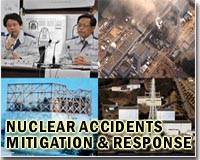 |
Vienna (AFP) March 20, 2011 The UN atomic watchdog Sunday noted "some positive developments" at Japan's stricken Fukushima nuclear power plant over the past 24 hours, but warned that the crisis there remained serious. "There have been some positive developments in last 24 hours, but the overall situation at the Fukushima Daiichi nuclear power plant remains very serious," Graham Andrew, a scientific and technical advisor to the head of the International Atomic Energy Agency, told a regular daily press briefing here. Efforts to restore electrical power to the reactor cooling systems on the site were continuing in "difficult conditions," Andrew said. Following an initial rise in pressure in the pressure vessel of unit 3, plans were made to vent it to avoid a possible explosion. "However, from information recently received from NISA (the Nuclear and Industrial Safety Agency), they have decided not to vent as the vessel pressure has started to reduce, which is good news," the expert said. The situation in the reactor's spent fuel ponds was "relatively stable but is still of concern," Andrew said. The IAEA still lacks data on water levels and temperatures at the spent fuel ponds at units 1, 2, 3 and 4. One "positive" development was that cooling has been restored to the reactor pressure vessels in units 5 and 6. Temperatures in the spent fuel ponds at these two units, "which had been rising in the last few days, have now fallen significantly," he said. Two diesel generators, one for each unit, were providing electricity to those units. Radiation levels in major Japanese cities "have not changed significantly since yesterday and remain below those which are dangerous to human health," Andrew added. In a statement posted on the IAEA's website, the agency said that workers had successfully placed the number 5 and 6 reactors "into cold shutdown". The reactors are thus "in a safe mode, with cooling systems stable and under control, and with low temperature and pressure within the reactor."
earlier related report "There is a long road ahead," Olivier Gupta, deputy director-general of the Nuclear Safety Authority (ASN), told a press conference in Paris. "The situation remains serious and precarious. This has not changed significantly for several days." Gupta cautioned that, even if power cables had been reconnected to the plant, "it still isn't possible to use them because of the risk of a short circuit." "Checks have to be made, junction box by junction box, and equipment by equipment." Overheating reactors at the plant have caused a buildup of hydrogen through a chemical reaction with the water surrounding the reactor core. This gas is highly flammable and since March 12 has already caused several blasts and a fire. Beyond the problem of short circuits, engineers also have to see if coolant pumps have survived the March 11 earthquake and tsunami, and pipes bringing water to the reactor units are unobstructed. "Pulling cables (to the plant) does not mean the problem is resolved," said Gupta. "It's a first necessary step for getting control of the situation, but it's still only a first step and many others will be needed before things are stabilised." In a press release, the ASN said "this serious accident has already led to major releases of radioactivity, which are continuing. "Regardless of how the situation develops, Japan will have to manage, over the long term, the deposits of radioactivity resulting from these releases." Gupta said his special concern was for a tank at the No. 3 reactor unit that houses spent fuel rods. These rods have to be constantly immersed in cooling water to prevent their external sheathing of zirconium from melting, which would releasing high doses of radiation to plant workers in the near vicinity. Gupta also referred to a so-called suppression pool located at the base of the No. 3 reactor. This ring-shaped water tank has until now dampened levels of radioactivity in gas that engineers have deliberately vented from the containment vessel in order to ease pressure inside the reactor. "If the suppression tank no longer works because of damage, that would lead to higher releases of radioactivity," Gupta said. Information about technical conditions at Fukushima is clouded by "many uncertainties," he added, pointing to the risk that sensors had been destroyed or damaged. "It is extremely difficult to get a precise view of the situation on certain points, not just for us but also for the plant operator and the Japanese authorities themselves."
Share This Article With Planet Earth
Related Links Bringing Order To A World Of Disasters A world of storm and tempest When the Earth Quakes
 Japan vies to restore power to wrecked atom plant
Japan vies to restore power to wrecked atom plantKitakami, Japan (AFP) March 20, 2011 Crews fighting to cool reactors at Japan's stricken nuclear plant hoped Sunday to switch partial power back on after a natural disaster that has left nearly 20,000 people dead or missing. The discovery of radiation in foodstuffs in regions around the plant, and of traces of radioactive iodine in Tokyo tap water well to the southwest, compounded public anxiety but authorities said there was n ... read more |
|
| The content herein, unless otherwise known to be public domain, are Copyright 1995-2010 - SpaceDaily. AFP and UPI Wire Stories are copyright Agence France-Presse and United Press International. ESA Portal Reports are copyright European Space Agency. All NASA sourced material is public domain. Additional copyrights may apply in whole or part to other bona fide parties. Advertising does not imply endorsement,agreement or approval of any opinions, statements or information provided by SpaceDaily on any Web page published or hosted by SpaceDaily. Privacy Statement |